Mental health support is becoming one of the biggest requests of Ukrainian media in the third year of the large-scale russian invasion. This was the topic of the discussion organized by the National Union of Journalists of Ukraine (NUJU) within the framework of the first international Summit titled Mental Health in Journalism. During the online event from October 8 to 10, experts from around the world discussed the importance of mental health for media professionals. They touched upon the topics of burnout, anxiety, and post-traumatic stress disorder in journalism.
“Ukrainian media workers have seen with their own eyes an incredible number of tragic events – the death of children, mass deaths of people, destruction of buildings and infrastructure. Colleagues also communicate with eyewitnesses who talk about the tragedies they experienced. None of us was ready for war, for such an emotional burden, and it became a very serious test,” Lina Kushch, the First Secretary of the NUJU, emphasized, opening the discussion.
The topic proposed by NUJU is “Psychological rehabilitation of Ukrainian journalists during the war: what methods work?” – got into the program of the three-day Summit from among 150 proposals from 45 countries of the world. The discussion, which was attended by about 30 participants, was devoted to the dangers faced by Ukrainian journalists during the war and the consequences for their psycho-emotional state.
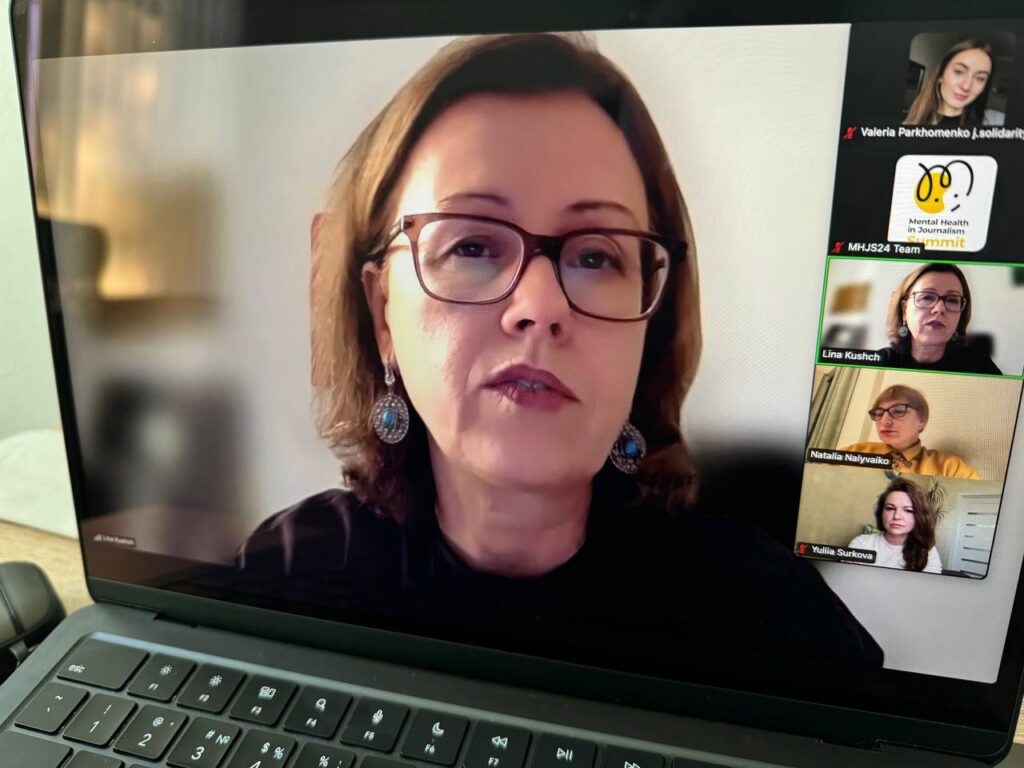
The speakers of the discussion were Yuliya Surkova, a war journalist who cooperates with AFP and UNICEF and has been covering events in the war zone since 2014, as well as Nataliya Nalyvaiko, a psychologist and the founder of the IN-Person Corporate company. It was this organization that provided a 24-hour hotline for psychological help for journalists and their family members throughout the year.
Ukrainian media workers work on the front line, cover events in the front-line territories, and communicate with those who have experienced violence, loss, left their homes, or were injured as a result of enemy shelling.
“At the beginning of 2022, we paid little attention to psycho-emotional problems,” recalls Lina Kushch. “We worked continuously 24 hours a day, seven days a week, without thinking about shifts or rest.”
One of the Union‘s high-priority tasks was to help evacuate journalists from the war zone. At the same time, the first alarming case of emotional burnout occurred in the organization’s team, the First Secretary noted. The journalist, who was engaged in searching for colleagues in Mariupol, the city then-surrounded by the russian military, and was in constant contact with journalists and their relatives, could not continue to work.
“Soon, many colleagues began to share similar problems. Complained of insomnia, anxiety, and fear. For the fact that they cannot bring themselves to communicate with people, scary pictures constantly appear in front of their eyes, they feel anxiety because it seems to them that all work has slowed down, relationships at work or in the family have deteriorated… These were typical complaints that we received,” adds Lina Kushch.
Such consequences became the impetus for finding solutions. Since then, the NUJU team has started introducing various forms of psychological support for journalists: educational events and webinars, self-help methods and support for colleagues, online and offline.
- The war constantly reminds of itself, even when journalists are not working directly on the front
Journalist Yuliya Surkova said that several difficult trips to the front and serious physical and emotional stress led to significant health problems. She had her first panic attack last year after the mass shelling of Kyiv, the media woman admitted.
“Then, a week after, when I was at home, I lost consciousness several times. This was repeated two or three times a day,” the journalist recalls.
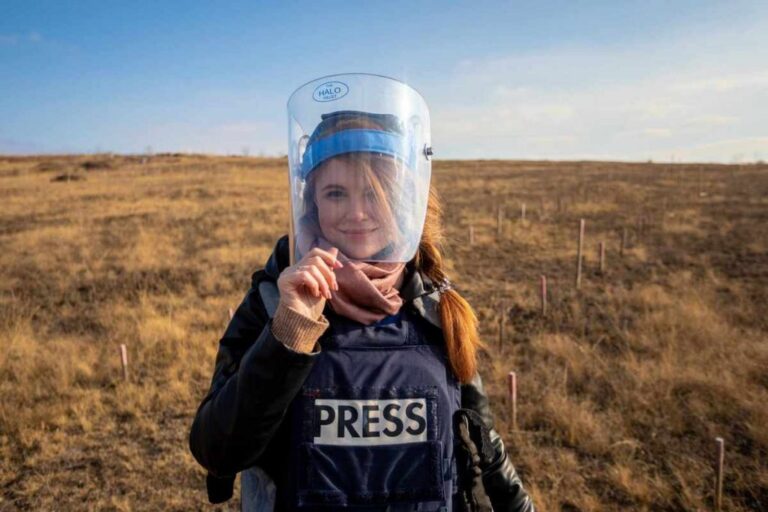
Such an experience forced her to see doctors, but they did not find any physical problems, which led the journalist to think about the need for psychological help. Yuliya now attends sessions with a psychologist once a week. Although it is expensive, especially for a freelancer, it really helps.
“Sustained support from a specialist works in conjunction with communication with other colleagues who have similar experiences. They understand you and can share their own methods that help overcome stress,” concludes the media woman.
The media woman tries to encourage her colleagues to turn to psychologists. However, she admits that, as a freelancer, she does not have access to regular support from the media.
“I have a very good team; they are like family to me; this is my very close circle of friends. Perhaps this is one of the reasons why I continue to work in the media sphere. For example, we support each other and share links to some psychological podcasts to better understand our emotions and problems, the journalist shared.
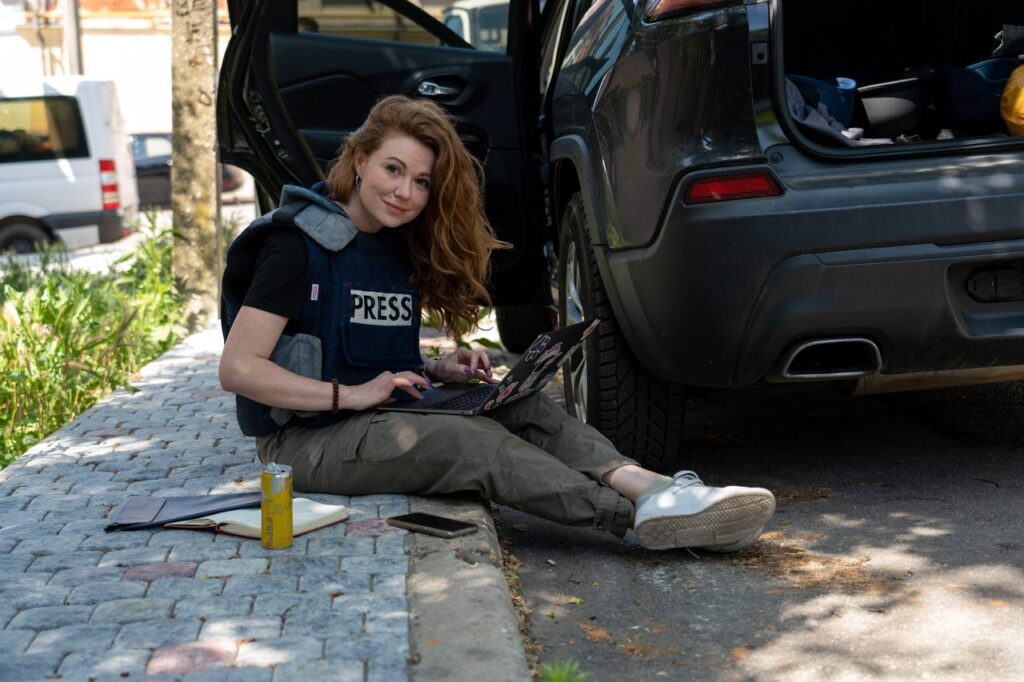
Media workers in Ukraine are aware of the need for psychological help, but many are not ready to turn to specialists. In Ukrainian society, there is still a stereotype that turning to psychologists is a sign of weakness. Because of this, a large number of journalists continue to struggle with their own emotions alone.
These problems became evident after the launch of Ukraine’s first psychological hotline for journalists at the end of 2022. The initiative, supported by UNESCO, made it possible to provide 24/7 operational psychological assistance to those who needed it in the most difficult moments.
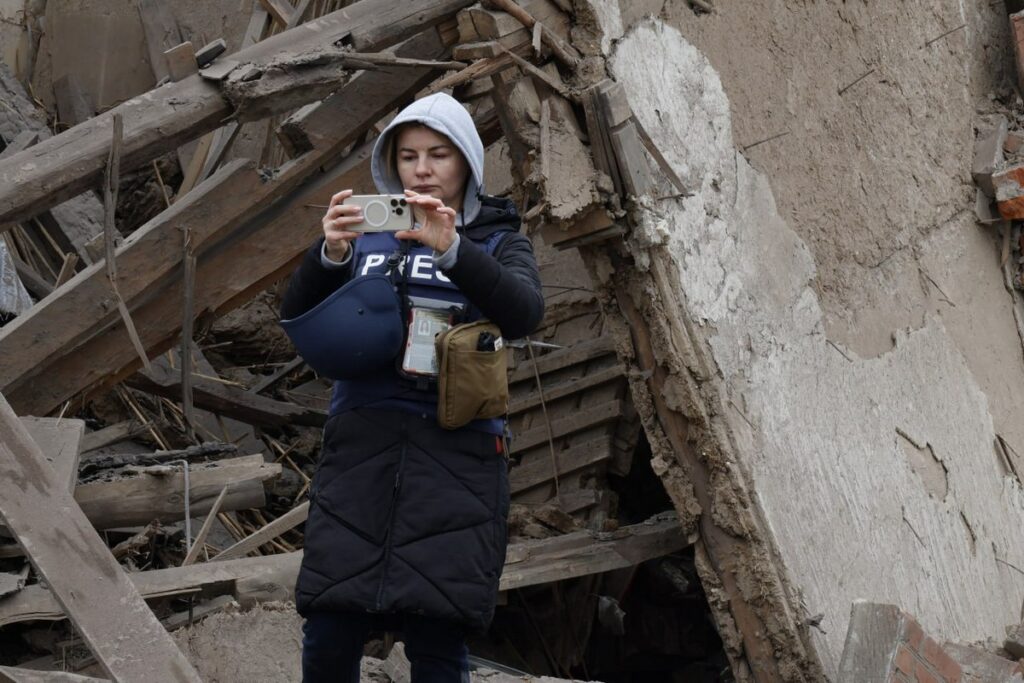
“Journalists could contact us at any time and receive support. We have created a group of professionals who provide this help, but the problem is that there is a certain stigma in society regarding turning to psychologists,” says psychologist Nataliya Nalyvaiko, who managed the psychological hotline for journalists.
Turning to psychologists is a manifestation of strength, not weakness
Stigma does not refer to mistrust of professional help but rather is expressed in an inner feeling of weakness. When a person thinks that he should cope with the problem on his own, explained the specialist. She emphasized that such attitudes can lead to even greater stress and burnout. To overcome prejudices, the company’s psychologists spoke at regular educational webinars for journalists organized by the Union:

Specialists received a lot of questions about them, and this shows how great the demand for psychological support is.
The speaker emphasized the critical importance of professional psychological support for journalists and noted that constant exposure to traumatic events, even if the journalist is not directly in danger, has a serious impact on mental health.
“As professionals, we began to provide support to journalists from the first minute of the war. We helped solve the most pressing issues: how to move, where to leave, where to hide, what to do in a dangerous situation. This was not standard psychological help but help in survival,” the expert noted.
According to her, since the opportunity to provide more specialized support to the media became available, the team took it very seriously:
“Journalists have finally been recognized as one of the most vulnerable groups in the psychological sense. Media workers, even if they are not directly involved in traumatic events, constantly encounter them: they see them, they document them. The effect of any observation of trauma on the body is practically the same as of being in it.”
The traumatic impact on the mental health of journalists is not limited to combat but to being in an environment of constant bad news every day. The constant threat to life, fear, observing the death of colleagues and other people – all this leaves its mark.
So, the first direction of psychological rehabilitation of Ukrainian journalists is professional psychological help and overcoming public prejudices against going to psychologists. However, there are still methods that, according to experts, should be implemented by both newsrooms and journalists.
- Support each other within the community
“It is very difficult to remain psychologically stable under constant shelling, but it is important to have a safe space to live and work. Journalists’ Solidarity Centers in six regions of Ukraine, created by the NUJU with the support of the International and European Federations of Journalists, as well as UNESCO, became such centers of support, in particular, mental support. Each of the centers has its own specifics and conducts various measures for psychological relief,” Lina Kushch said.
“For example, in Kharkiv, a city located close to the border with russia, our JSC organized a holiday for children of media workers. Colleagues felt at least some relief against the background of constant danger. In Ivano-Frankivsk, we organized hiking trips, in particular, to the mountains for local journalists and fellow immigrants: such walks in nature help to reduce stress. In Zaporizhzhia, which is often under fire, meetings, and cultural events are organized for 40 journalist-immigrants from the occupied territories, offering them opportunities for creative self-expression and communication.”
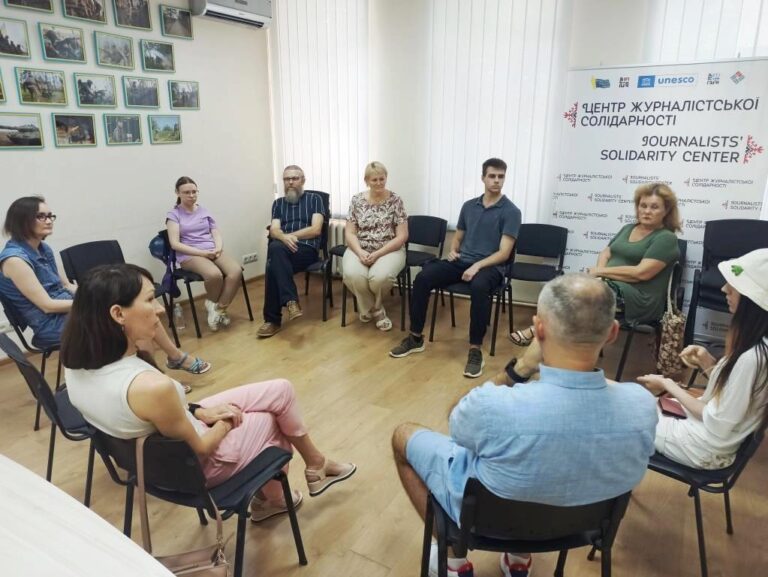
- Include issues of psychological assistance in safety training sessions
“For example, during the safety training for female journalists, the Union paid particular attention to the issue of mental health of female journalists during the war,” says Lina Kushch. According to her, more than 70 percent of appeals to Journalists’ Solidarity Centers come from women. Among those who seek psychological help, women make up 90 percent or more.
- Find topics that are important to male journalists
Men usually neglect their own mental health. Despite this, the Union recalls: two topics of psychological webinars aroused increased interest among male journalists: how to talk to children about the war and how to maintain contact with relatives at a distance.
- Plan time for rest
Yuliya Surkova advises to be frank with the management of the newsrooms. Many journalists are afraid of sounding weak or unprofessional when they say they can’t handle the workload. However, according to her, rest and time to recover is not something luxurious, but a necessity to maintain productivity and health.
“Probably, this is my main question during all these years,” the journalist notes. “I am very tired all the time after trips to the front. If you have five hours of sleep, that’s happiness. The question of the balance between work and rest remains open in my life. Sometimes, I try to find time to recover, but this task becomes almost unmanageable due to constant stress and danger.”
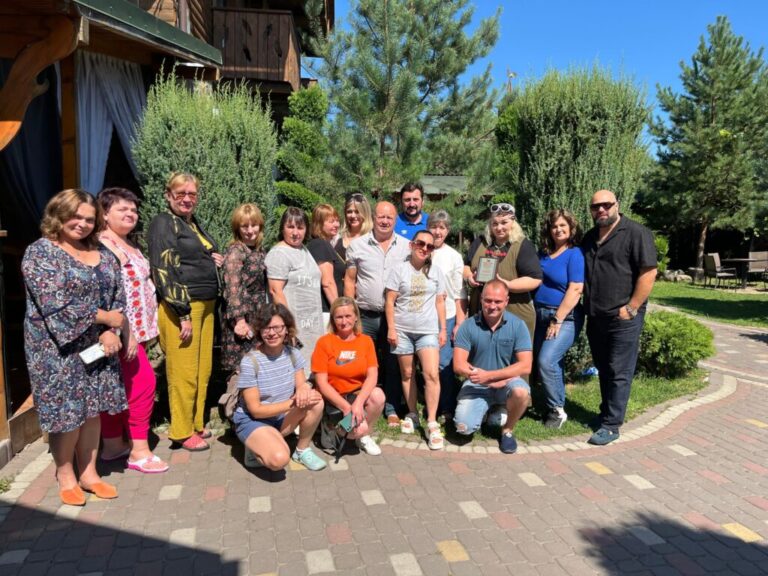
- Temporarily change the environment
“It is impossible to distance yourself if you stay at home and keep thinking about work. You need to change your surroundings or at least divert your thoughts from work tasks. We all probably need a long vacation somewhere far away from this war. Maybe even in other European countries. Because in most Ukrainian regions, we simply cannot sleep properly because of the threats of shelling, the work of air defense, and air alarms. And this has a very bad effect on mental health,” Yuliya Surkova emphasized.
Journalist retreats are an opportunity to temporarily leave the environment where the fire is constantly burning (both literally and figuratively).
“We found the retreats to be very helpful. These are trips to places outside the workplace where people can recover. During such events, the participants not only rest physically but also have the opportunity to recover emotionally by communicating with colleagues who are going through the same difficulties. Journalists share their stories in a group, and this helps them to understand that they are not alone in their feelings. This relieves the feeling of guilt and isolation that often haunts those who work in such conditions,” added Nataliya Nalyvaiko.
The format of rest in a safe place, combined with communication with psychologists, allows you to distract yourself for a week or two from air alarms, explosions, and constant threats.
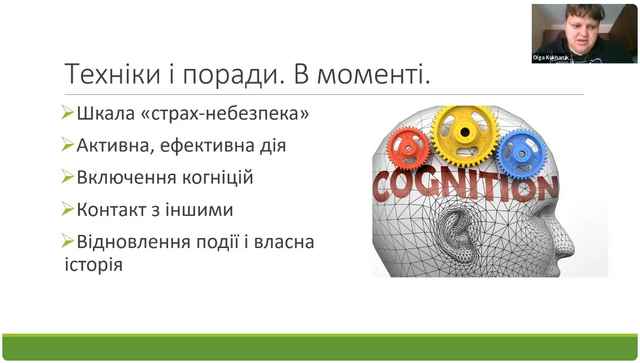
- Separate work and personal space on social networks
It is difficult for journalists to stop, especially when work requires constant immersion in news and social networks, but Lina Kushch recommended separating work and personal space by creating separate accounts on social networks for work and personal contacts.
Fatigue, burnout, and constant stress are what every journalist who works in wartime faces. Therefore, long-term psychological support for media workers who are constantly in a conflict zone is no less important than the stability of the media.
“Support is needed not only from colleagues and family but also professional help from psychologists. Without it, it is simply impossible to continue working and maintain your mental health,” Nataliya Nalyvaiko noted.
The Mental Health in Journalism Summit became the first global platform where psychological health issues in the journalistic community were openly discussed. Not only did it draw attention to the urgent problems of mental health of media workers, but it also outlined ways to solve them, relying on the experience of specialists from around the world and the unique experience, in particular, of Ukrainian journalists who live and work in war conditions.
*****
Psychological support is one of the key areas of work of the network of Journalists’ Solidarity Centers of the NUJU. This initiative is implemented with the support of the International and European Federations of Journalists, as well as UNESCO. It is destined to help media representatives working in Ukraine during the war. The JSCs operate in Kyiv, Lviv, Ivano-Frankivsk, Chernivtsi, Zaporizhzhia, and Dnipro and provide journalists with organizational, technical, legal, psychological, and other types of assistance.
In this material, we also wrote how exactly the JSCs contribute to the preservation of the mental health of the journalistic community.
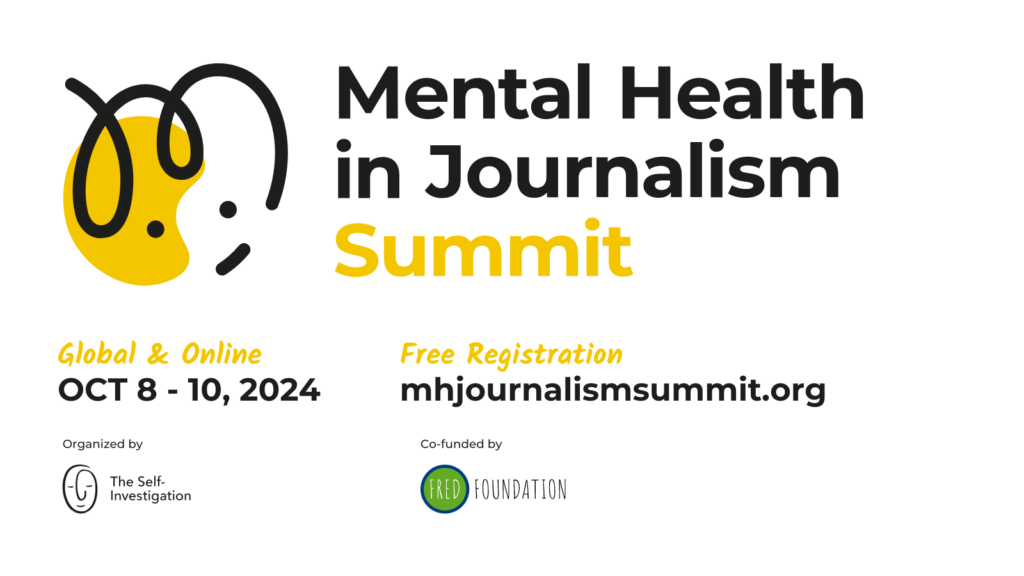
Valeriya Muskharina, NUJU Information Service

 THE NATIONAL UNION OF
JOURNALISTS OF UKRAINE
THE NATIONAL UNION OF
JOURNALISTS OF UKRAINE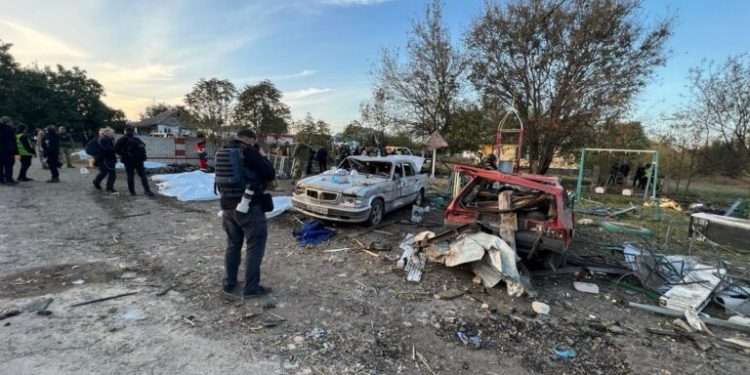
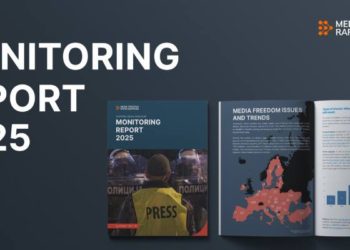















Discussion about this post